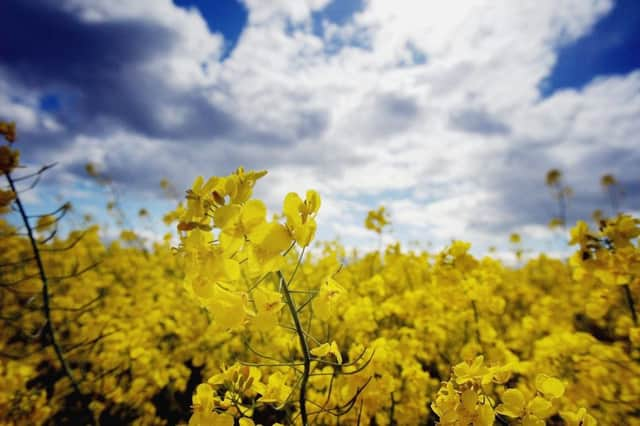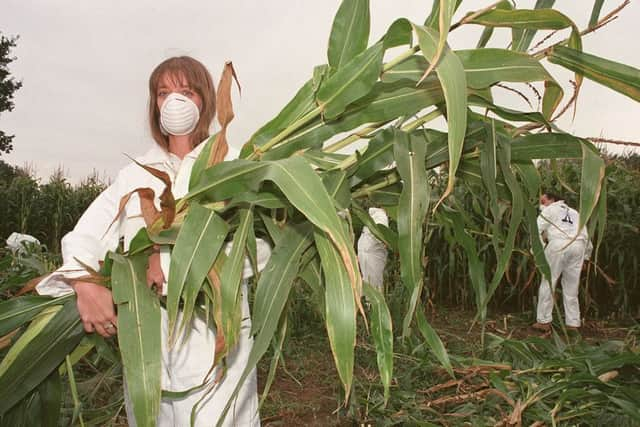Farmers alarmed at SNP pledge to ban GM crops


Leading figures in Scotland’s agricultural industry warned that the farming sector would suffer as a result of the ban, which will be announced today by Rural Affairs Secretary Richard Lochhead.
Lochhead has signalled that the Scottish Government will take advantage of new EU rules which allow countries to opt out of growing EU-authorised GM crops.
Advertisement
Hide AdAdvertisement
Hide AdAlthough welcomed by environment campaigners, the move was criticised by farmers, who fear it will make their produce less competitive.


Opposition politicians warned that the SNP’s position would drive those conducting groundbreaking research into GM products out of Scotland.
The Scottish Government’s stance will mean that Scotland adopts a different position on GM crops than south of the Border, where farmers are looking to take advantage of the new technology.
The Scottish ban has been made possible by a new EU directive, which came into force earlier this year.
Under EU rules, GM crops must be formally authorised before they can be cultivated in the EU geographical area.
The new directive gives member states and devolved administrations the power to make their own decisions on the cultivation of genetically modified organisms (GMOs) within their territory.
There had been hope within the agricultural community that passing control over GM policy to Edinburgh would see the relaxation of the SNP’s long-standing misgivings towards plant biotechnology.
But yesterday Lochhead said he intended to take “full advantage” of the new rules and would “ban” GM crops in Scotland.
Advertisement
Hide AdAdvertisement
Hide AdLochhead’s announcement was met with dismay by Allan Bowie, the president of the National Farmers Union Scotland (NFUS). “It is very disappointing,” said Bowie. “We thought they had possibly started to understand the potential benefits [of GM]. The hope was to have open discussion and allow science to show the pros and cons for all of us to understand either the potential benefits or potential downsides. What we have now is that our competitors will get any benefits and we have to try and compete. It is rather naïve.”
The UK government has indicated that the new EU legislation could see the commercial growing of GM crops such as maize and oil seed rape in England. The crops, which have been genetically modified to produce higher yields and withstand higher concentrations of weedkiller, would be sold for animal feed or to produce energy.
Andrew McCornick, a vice-president of the NFUS, said: “My personal view is this is simply going to make us less competitive. It means that other countries that are going to adopt this – and I would call it biotechnology rather than GM – and that will affect our efficiency and our farmers’ ability to compete with our neighbours. There is going to be one side of the Border in England where they may adopt biotechnology, but just across the River Tweed farmers are not going to be allowed to. How are these farmers going to be capable of competing in the same market? It is certainly won’t be delivering a level playing field with other countries.”
Lochhead said the Scottish Government would be submitting a request that Scotland is excluded from any European consents for the cultivation of GM crops, including the variety of genetically modified maize already approved and six other GM crops that are awaiting authorisation.
The Rural Affairs Secretary argued that banning GM crops would enhance Scotland’s reputation for her “beautiful, natural environment” and would “protect and enhance” the nation’s “clean, green status”.
“There is no evidence of significant demand for GM products by Scottish consumers and I am concerned that allowing GM crops to be grown in Scotland would damage our clean and green brand, thereby gambling with the future of our £14 billion food and drink sector,” Lochhead said.
Lochhead was supported by Richard Dixon, Director of Friends of the Earth Scotland.
Dixon said: “The Scottish Government has been making anti-GM noises for some time, but the new Tory Government has been trying to take us in the direction of GM being used in the UK, so it is very good news that Scottish ministers are taking that stance. If you are a whisky producer or breeding high quality beef, you ought to be worried if you don’t want GM, but it is going to come to a field near you and you were worried that there was going to be some contamination. It is certainly in Scotland’s interests to keep GM out of Scotland.”
Advertisement
Hide AdAdvertisement
Hide AdConservative MSP Murdo Fraser, however, condemned the ban.
“Many of Scotland’s research institutions have been at the forefront of developing this technology, but have been stymied by the SNP’s Neanderthal approach to GM foods. All the SNP’s stance will do will drive research out of Scotland into other parts of the UK and Europe and send the message that this Government prefers superstition to science,” Fraser said.
A spokesman for the Invergowrie-based James Hutton Institute, which has been at the forefront of GM research, said: “Our goal is to deploy GM alongside other technologies to identify the best sources of genes to advance the sustainable production of high yielding crops with superior quality and nutritional value, with more efficient use of natural resources and with minimal impact on the environment.”